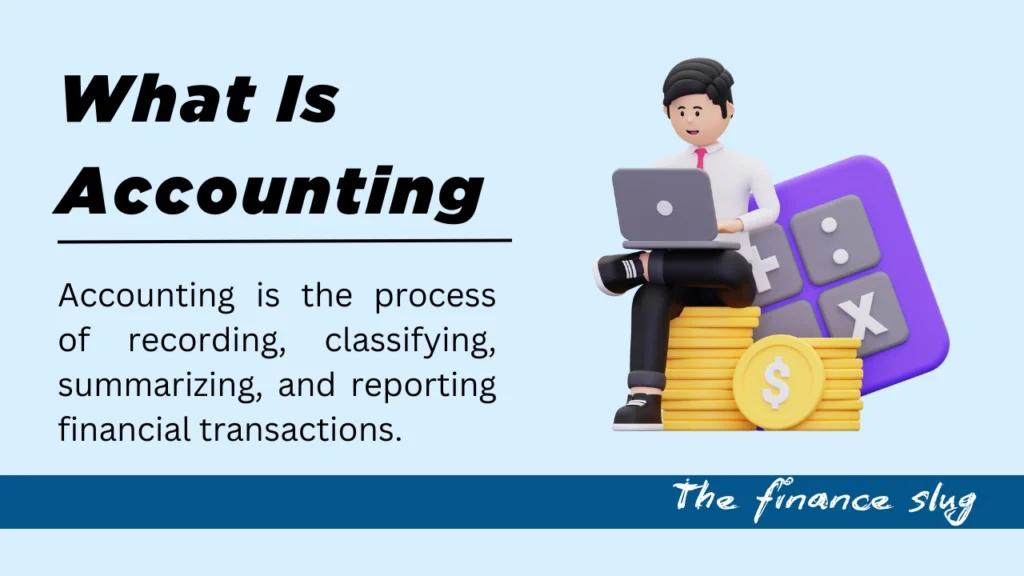
Accounting is often seen as the backbone of financial decision-making. It is the systematic process of tracking, summarizing, and analyzing financial transactions to provide a clear picture of financial health. Whether you’re managing personal finances, running a small business, or overseeing a multinational corporation, accounting is essential for understanding your financial position and making informed decisions.
In this article, we will explore the fundamentals of accounting, including its principles, types, and key concepts such as the accounting equation. We will also delve into the tools, technologies, and benefits of effective accounting practices.
What is Accounting?
Accounting is the process of recording, classifying, summarizing, and reporting financial transactions. It serves as a bridge between raw financial data and actionable insights by doing ratio analysis. By transforming numbers into meaningful information, accounting helps individuals and businesses understand their financial situation and plan for the future.
For instance, if a small business owner wants to know whether their company is profitable, accounting provides the tools to assess income, costs, and net earnings. Without accounting, managing finances would be like navigating a ship without a compass—uncertain and risky.
Why is Accounting Important?
Accounting is more than just crunching numbers; it is a critical tool for financial management. Its importance lies in its ability to provide clarity, ensure compliance, and guide strategic decision-making.
For businesses, accounting helps evaluate performance, identify growth opportunities, and ensure legal obligations like taxes are met. For individuals, it simplifies budgeting, saving, and planning for significant life events like buying a home or retiring.
A retailer might use accounting to track monthly revenue and expenses. By analyzing these figures, they can identify which products are most profitable and which areas need cost-cutting measures. This data-driven approach ensures informed decision-making and sustainable growth.
The Accounting Equation: A Foundation for Financial Accuracy
At the heart of accounting is the accounting equation, a simple yet powerful concept that forms the foundation of financial record-keeping:
Assets = Liabilities + Owner’s Equity
This equation ensures that all financial transactions are recorded in a balanced manner. Let’s break it down:
- Assets represent what a business owns, such as cash, inventory, or property.
- Liabilities are what the business owes, such as loans or accounts payable.
- Owner’s Equity is the owner’s stake in the business after liabilities are subtracted.
For example, if a company owns $50,000 in assets and owes $20,000 in liabilities, the remaining $30,000 is the owner’s equity. Every transaction in accounting impacts at least two of these components, maintaining balance and accuracy.
Principles of Accounting
Accounting is governed by a set of principles designed to ensure consistency, reliability, and transparency in financial reporting. These principles provide a framework for recording and analyzing financial data.
- Accrual Principle: Revenue and expenses are recorded when they are earned or incurred, not when cash is exchanged. This ensures a true reflection of financial performance.
- Consistency Principle: Accounting methods must remain consistent over time to allow meaningful comparisons.
- Conservatism Principle: Accountants should recognize expenses and liabilities promptly but delay recognizing revenue until it is certain.
- Going Concern Principle: Financial reports assume that a business will continue operating in the foreseeable future unless stated otherwise.
These principles help businesses produce accurate and comparable financial statements that are trusted by investors, creditors, and other stakeholders.
Golden rules of Accounting
Accounting is guided by foundational rules and principles that ensure consistency, accuracy, and transparency in financial reporting. Among these, one critical concept is the golden rule of accounting, which dictates how to record transactions based on account types.
The golden rule simplifies accounting by breaking it into three key categories:
- Personal Accounts: Debit the receiver, credit the giver.
- Real Accounts: Debit what comes in, credit what goes out.
- Nominal Accounts: Debit all expenses and losses, credit all incomes and gains.
Understanding these rules is essential for accurate bookkeeping and financial reporting. If you’d like to explore this concept in greater detail, check out our comprehensive guide on the Golden Rule of Accounting for examples and practical applications.
Types of Accounting and Their Applications
Accounting isn’t a one-size-fits-all discipline. Various branches of accounting address different needs and objectives:
Financial Accounting focuses on preparing financial statements like the balance sheet, income statement, and cash flow statement. These reports are primarily intended for external stakeholders, such as investors and regulators.
Managerial Accounting caters to internal decision-making by providing detailed reports on costs, budgets, and performance metrics. Unlike financial accounting, it is more flexible and tailored to the needs of the business.
Cost Accounting examines the costs associated with production. By analyzing these costs, businesses can identify inefficiencies and improve profitability.
Tax Accounting ensures compliance with tax laws and helps businesses optimize their tax obligations through strategic planning.
Forensic Accounting involves investigating financial discrepancies and fraud. It is often used in legal cases to uncover financial irregularities.
Each type of accounting plays a unique role, contributing to a comprehensive understanding of financial performance and stability.
How Does Accounting Work?
Accounting begins with bookkeeping, which involves recording transactions such as sales, purchases, and payments. These records are organized into categories, making it easier to analyze and summarize the data.
Once the data is recorded, accountants use it to prepare financial statements.
- Income Statement: Shows profits and losses over a specific period.
- Balance Sheet: Provides a snapshot of assets, liabilities, and equity at a particular point in time.
- Cash Flow Statement: Tracks the flow of money into and out of the business.
These statements provide a clear and detailed picture of financial performance, helping businesses and individuals make informed decisions.
Role of Technology in Modern Accounting
The rise of technology has transformed accounting, making it more efficient and accessible. Tools like QuickBooks, Xero, and Sage automate many accounting tasks, such as invoicing, expense tracking, and financial reporting. This not only saves time but also reduces the risk of errors.
Cloud-based accounting systems have added another layer of convenience. They allow users to access their financial data from anywhere with an internet connection. This flexibility is especially valuable for small businesses and startups.
Moreover, emerging technologies like artificial intelligence and blockchain are revolutionizing the field. AI-powered tools can analyze large volumes of data to identify patterns and anomalies, while blockchain enhances transparency and security in financial transactions.
Common Misconceptions About Accounting
Despite its importance, accounting is often misunderstood. One common myth is that accounting is all about math. While numbers are integral to the discipline, accounting also requires analytical thinking, problem-solving, and communication skills.
Another misconception is that accounting is only for large corporations. In reality, individuals and small businesses benefit significantly from proper accounting practices. Whether it’s tracking personal expenses or preparing for a tax audit, accounting provides the tools needed for financial success.
Lastly, some people view accounting as tedious or boring. In truth, it is a dynamic field that involves strategy, decision-making, and innovation.
Conclusion
Accounting is much more than a financial necessity—it’s a tool for achieving clarity, making informed decisions, and driving growth. By understanding its principles, leveraging modern tools, and applying its insights, businesses and individuals can unlock new opportunities and reach their financial goals.
Whether you’re just starting your financial journey or looking to refine your practices, accounting provides the foundation for success and sustainability. The more you engage with accounting, the more empowered you become to navigate the complexities of the financial world.
Article Sources
- Stock Market Crash Today: A Bloodbath on Monday – What You Need to KnowPublished on financeslug.xyz The global financial markets are reeling from a massive sell-off, and Indian equity benchmark indices BSE Sensex and Nifty50 took a brutal… Read more: Stock Market Crash Today: A Bloodbath on Monday – What You Need to Know
- Wall Street Bonuses Reach Record $47.5 Billion in 2024, Up 34% from Previous YearWall Street’s bonus pool hit a record $47.5B in 2024, up 34% from 2023, marking the highest payout since 1987.
- How to Convert Delimited CSV Data into Columns in ExcelCSV (Comma-Separated Values) files are widely used for data exchange, but when opened in Excel, the data often appears in a single column instead of… Read more: How to Convert Delimited CSV Data into Columns in Excel
- Harvard University Announces Free Tuition for Families Earning $200K or LessHarvard’s New Tuition-Free Policy: What You Need to Know Harvard University has unveiled a groundbreaking initiative to make higher education more accessible. Starting from the… Read more: Harvard University Announces Free Tuition for Families Earning $200K or Less
- Eli Lilly’s 1.8B Dollar Investment in Weight Loss DrugsIreland’s Weight-Loss Drug Boom: A Game-Changer for Economy and Healthcare Ireland is witnessing a surge in pharmaceutical investments, thanks to the skyrocketing demand for weight-loss… Read more: Eli Lilly’s 1.8B Dollar Investment in Weight Loss Drugs







Pingback: Accounting Concepts and Principles: A Step-by-Step Overview
Pingback: Accounting Methods: Accrual vs Cash Accounting - FinanceSlug